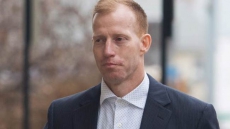TORONTO — A rash of suicide attempts by young people on the Attawapiskat reserve appears to be a case of so-called suicide contagion, a chain reaction triggered within the community by abominable living conditions and a shared sense of despair and hopelessness, experts say.
Attawapiskat's chief declared a state of emergency Saturday after the remote northern Ontario community recorded 11 suicide attempts so far this month and 28 others in March. Community leaders also intervened after subsequently discovering that 13 other young people on the reserve — including a nine-year-old — had made a pact to take their own lives.
"As its name implies, (the idea of suicide) becomes contagious," said Robert Olson, head of information services at the Centre for Suicide Prevention. "It's often defined as a suicide cluster, multiple suicidal behaviours in a time frame and within a specific geographic area."
Choosing to end one's life is seen as a way to escape severe and unrelenting emotional pain, Olson said Tuesday from Calgary. "If someone sees their relative or, say, their good friend and they seemingly have solved the problem, it perhaps incites in them the idea, hence the contagion element."
Suicide rates among First Nations youth are five to seven times higher than for non-Aboriginal youth, while the rate among Inuit youth is 11 times the national average, among the highest in the world.
Dr. Laurence Kirmayer of McGill University, founder and director of the Network for Aboriginal Mental Health Research, said suicide is a behaviour, but it can also be seen as an idea.
"And ideas can pass from person to person," he said from Montreal. "So the behaviour can be transmitted as an explicit idea that people talk about or as a model people see and may copy on some level, consciously or unconsciously."
Kirmayer said that how much an individual models their behaviour on someone else's is influenced in part by the similarities they see between themselves and the other person.
"So in an indigenous community, where many young people are closely related, they're the same age, they're living in much the same circumstances ... there's the high likelihood of ideas circulating, behaviours circulating and modelling going on."
Such suicide contagion among young aboriginal Canadians is driven by a complex set of factors, including a history of their ancestors being forced from their lands, their languages and cultures decimated, and control of their lives taken away. The trauma of sexual and physical abuse in residential schools that haunts many aboriginal families and often widespread substance abuse compounds the despair within communities.
For many living on remote or rural reserves, poverty, "wretched housing," a lack of clean water, and a dearth of educational and employment opportunities add to the sense of hopelessness that many indigenous youth feel today, said Kirmayer.
Human beings, he said, can cope if they have hope.
"But if, in fact, there's no realistic reason to think it will be better tomorrow and if you don't feel you have the reins in your hand to make a change, then you're stuck between the adversity of the past and present and a bleak set of options for the future."
Olson said not all aboriginal communities in Canada are beleaguered by incidents of suicide — in fact, many indigenous languages have no word for the act. And he doesn't believe widespread media coverage of the current spate of attempts in Attawapiskat, the January shootings in La Loche, Sask., and the recent suicides of four teens on the Pimicikamak Cree Nation in Manitoba will spark suicide contagion on reserves elsewhere in the country.
"As long as it's reported in a responsible way, I don't think the media has anything to do in any major way with helping this contagion to spread," he said. "It's more a geographical phenomenon."
Kirmayer isn't so sure that's the case.
"It can and there's a huge concern about that," he said.
"Here, we're dealing with a large phenomenon, and there's a couple of risks. One, it puts the model out there, so people who are already in distress are saying that's very thinkable now, and if thinkable, maybe doable," he said of the notion of suicide.
"The second issue is it's demoralizing, so people say we're all really suffering terribly and we're just as bad off as they are and therefore this is something we can really contemplate."
At the same time, there's a positive side to the media drawing attention to the crisis in that it functions as a cry for help, and has begun sparking a response by governments to improve not only conditions for Attawapiskat residents, but also for aboriginal Canadians across the country, he said.
Still, while it's beneficial if such media awareness-raising helps gather momentum for change, Kirmayer said it could also prompt people to see suicide as a way to draw attention to the desperate plight of people on many reserves.
"You're feeling powerless, no one is listening to you. Well, here's one way at least to get people to listen.
"But you don't want suicide to be the way that people do that," he said. "You want to feel that you can get attention other ways that are effective and not self-destructive."




